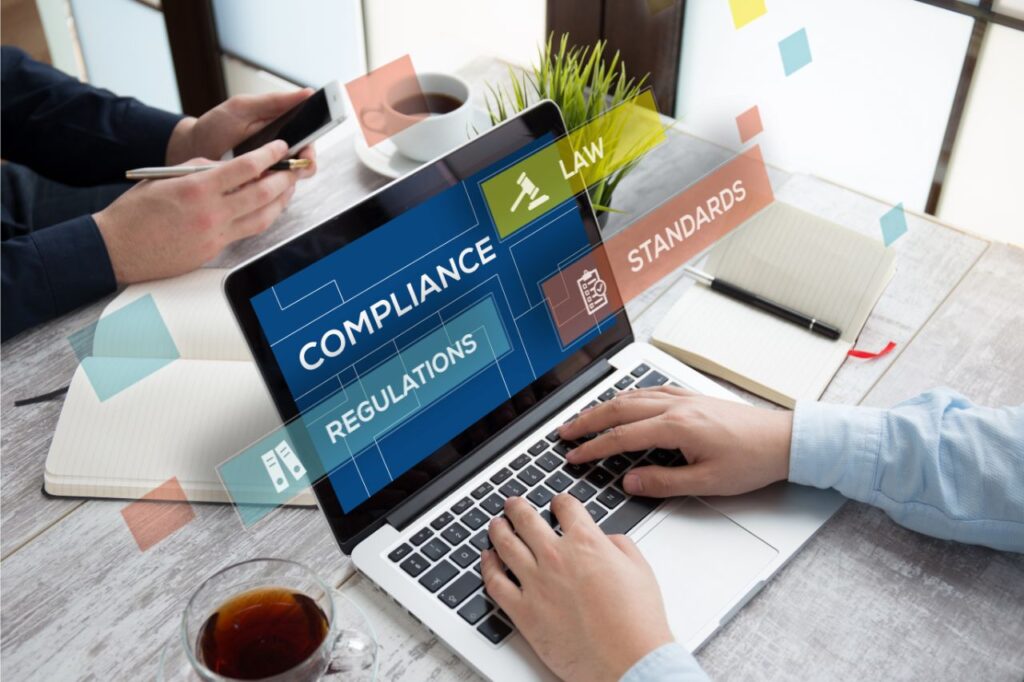Property management compliance is a challenging environment. Navigating the legal landscape of property management in New Zealand can be daunting. With constant updates and a complex web of regulations, staying compliant is essential for property managers, real estate agencies, and landlords. This blog post will guide you through understanding the current regulatory environment, recent changes, and strategies for staying informed and compliant.
The Importance of Staying Updated in Property Management
Staying updated with legal changes in property management is crucial for several reasons. For property managers, compliance means avoiding hefty fines and legal disputes. For real estate agencies, it ensures the smooth operation of rental services and safeguards their reputation. Landlords benefit by maintaining a good relationship with tenants and avoiding potential legal issues.
Understanding the Regulatory Environment

The Current Legal Framework
New Zealand’s property management sector is governed by a range of laws designed to protect tenants and landlords. Key legislation includes the Residential Tenancies Act, the Healthy Homes Guarantee Act, and various consumer protection laws. Each of these laws has specific requirements that property managers must adhere to, ensuring the safety and fairness of rental agreements.
Key Regulatory Bodies
Several regulatory bodies oversee property management in New Zealand. The Ministry of Business, Innovation, and Employment (MBIE) plays a significant role in setting and enforcing property management laws. Other key bodies include the Tenancy Tribunal, which resolves disputes between landlords and tenants, and the Privacy Commissioner, responsible for upholding privacy laws.
Recent Regulatory Changes
Significant Changes in the Past Year
The past year has seen notable changes in property management laws. Amendments to the Residential Tenancies Act introduced new provisions on rent increases, termination of tenancies, and pet ownership. Additionally, the Healthy Homes Guarantee Act now requires landlords to meet specific standards of warmth, dryness, ventilation, and heating in rental properties. You can read more on the Healthy Homes Act in a recent post.
One of the most recent updates to Property Management was the introduction of the Residential Property Manager Bill in August 2023. The Bill aims to create a comprehensive regulatory regime for residential property managers and residential property management organisations. This provides assurance to property owners, and the tenants that rent their properties, that all residential property managers meet conduct and competency standards and are qualified and accountable.
Impact on Day-to-Day Operations
These changes have a direct impact on the daily operations of property managers, real estate agencies, and landlords. Ensuring compliance with the Healthy Homes standards, for example, requires regular property inspections and maintenance. The amendments to the Residential Tenancies Act mean that property managers must stay vigilant about rent reviews and tenancy agreements.
Strategies for Staying Informed
Resources and Tools
To keep up with regulatory updates, property managers can subscribe to industry newsletters, attend seminars and webinars, and follow government publications. Online resources, such as the MBIE website, provide valuable information on legislative changes and compliance requirements.
Proactive Measures
Proactive measures are essential in adapting to regulatory changes. Regularly reviewing and updating policies and procedures ensures that property management practices remain compliant. Engaging with legal professionals for advice on specific issues can also prevent potential legal disputes.
Best Practices in Compliance
Implementing Compliant Practices
Implementing compliant practices involves developing clear policies for tenant selection, rent collection, property maintenance, and dispute resolution. These policies should be regularly reviewed and updated to reflect the latest legal requirements.
Real-World Examples
Real-world examples can provide valuable insights into successful compliance. For instance, some property managers have implemented comprehensive training programs for staff, focusing on legal obligations and customer service. Others have adopted advanced property management software to automate compliance tasks and stay updated with legal changes.
Privacy and Data Protection
With increased reliance on technology, handling tenant and landlord data responsibly is crucial. The Privacy Act 2020 imposes strict obligations on how personal information is collected, stored, and used. Property managers must ensure they have robust data protection measures in place to avoid breaches and legal penalties.
Employment Law Considerations
Managing Staff Effectively
Property managers often employ staff to handle various aspects of rental management. Understanding employment law is essential for managing staff effectively, including compliance with minimum wage requirements and addressing workplace disputes.
Continuous Training
Continuous training for staff on legal obligations, industry best practices, and customer service is vital. Regular training sessions can help staff stay informed about regulatory changes and improve their ability to handle tenant inquiries and issues.
The Role of Technology in Compliance
Utilising Property Management Software
Technology plays a pivotal role in ensuring compliance. Property management software can automate tasks such as rent collection, property inspections, and maintenance scheduling. Advanced software solutions also integrate legal updates, helping property managers stay compliant with minimal effort.
Leveraging AI and Data Analytics
AI and data analytics can further enhance compliance efforts. These technologies can analyse data trends and predict potential compliance issues, allowing property managers to address them proactively. For example, AI-powered tools can monitor rental market trends and suggest optimal rent adjustments in line with legal requirements.
Building a Strong Landlord-Tenant Relationship

Effective Communication
Effective communication is key to building a strong relationship between landlords and tenants. Regular updates on property maintenance, rent reviews, and legal changes can foster trust and transparency. Providing tenants with clear information on their rights and responsibilities also helps prevent disputes.
Resolving Disputes Amicably
When disputes arise, resolving them amicably is crucial. The Tenancy Tribunal provides a formal process for dispute resolution, but many issues can be addressed through open communication and negotiation. Property managers should have a clear procedure for handling complaints and mediating conflicts.
The Financial Benefits of Compliance
Avoiding Fines and Penalties
Compliance with property management laws can save landlords and property managers from costly fines and legal penalties. Non-compliance with regulations such as the Healthy Homes Guarantee Act can result in substantial financial consequences.
Enhancing Property Value
Maintaining compliant properties can enhance their value. Properties that meet legal standards of warmth, dryness, and safety are more attractive to tenants, leading to higher occupancy rates and rental income. Additionally, well-maintained properties require fewer costly repairs in the long run.
The Future of Property Management
Emerging Trends
The property management industry is continuously evolving, with new trends shaping its future. Sustainability and energy efficiency are becoming increasingly important, with regulations likely to focus more on environmental standards. Adopting sustainable practices can benefit both landlords and tenants while ensuring compliance with future regulations.
Adapting to Change
Adapting to change is essential for success in property management. Staying informed about emerging trends and regulatory updates allows property managers to anticipate and respond to new challenges effectively. Flexibility and a proactive approach are key to navigating the dynamic legal landscape.
Final Thoughts
Staying informed and compliant with property management laws in New Zealand is essential for property managers, real estate agencies, and landlords. By understanding the regulatory environment, adopting proactive measures, and implementing best practices, you can protect your business and provide exceptional service to tenants.
Make compliance a priority, and you’ll not only mitigate risks but also enhance your reputation as a reliable and professional property manager. Together, we can build a stronger, more compliant property management industry in New Zealand. If you are looking for a compliant Property Management agency in Wellington, look no further than Taylor Property Plus. Get in touch today and one of the team will be more than happy to talk to you about our business and how we can work with you to ensure a smooth renting experience whether you are a landlord or prospective tenant.
Frequently Asked Questions
What laws do I need to be aware of as a landlord in New Zealand?
Key legislation includes the Residential Tenancies Act, the Healthy Homes Guarantee Act, and the Privacy Act 2020. These cover everything from rent increases and tenancy terminations to minimum warmth and ventilation standards, as well as how tenant data is collected and stored.
How can I make sure my rental property stays compliant with changing regulations?
Stay informed by following updates from MBIE, attending industry seminars, and reviewing your policies regularly. Many landlords also work with a property management agency to handle inspections, maintenance, and legal updates on their behalf.
What happens if my property doesn’t meet compliance standards?
Non-compliance can lead to fines, legal disputes, and damage to your reputation. For example, failing to meet Healthy Homes standards can result in significant penalties. Staying compliant not only avoids these risks but also makes your property more attractive to quality tenants.



